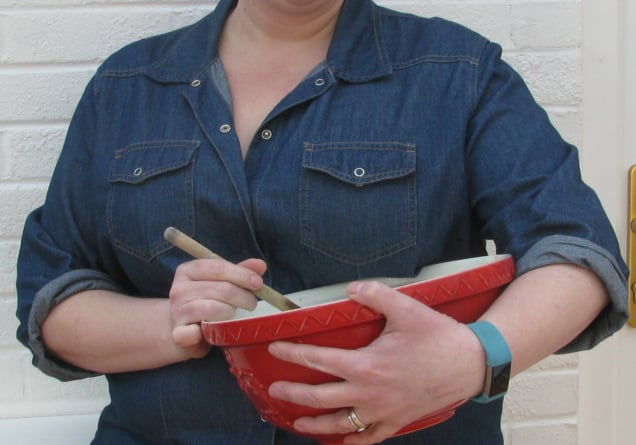The week-by-week account of a thirty-something Monmouth woman who chose to step away from the modern-day consumer society and live for 40 days on World War II rations makes fascinating reading.
From her involvement with the CAFOD (Catholic Agency for Overseas Development) campaign to combat global hunger, Claud Fullwood has strong feelings about the divide between waste and want and was curious to find out what lessons her generation could learn from history.
At the time Claud was immersed in the typical London lifestyle of dining out, takeaways, packaged sandwiches and 24/7 shopping.
But raised by a mother who ’could make dinner out of an old boot!’ she had always enjoyed cooking as much as eating.
"I learned so much from her. She was great at household economy. She raised a family of five on a limited income in a big, not very well-heated house, keeping us all well fed with nothing wasted.
"Sunday roast became Monday’s bubble and squeak, Tuesday’s rissotto... She was also really good at making traditional dishes from other countries like France, Italy and Greece.
"She’d look in the fridge to see what was there then create something. ’If I have an onion and garlic or an egg I can make a meal’ she’d say.
"With food bank use increasing, food waste a major concern and the emphasis on shopping locally and seasonally to reduce our carbon footprint, I think my generation needs to rethink the way we live - to get back in touch with the ground beneath our feet.
"I’ve always been interested in the 1940s. I think we have so much to learn from that period. People were thrifty and wise and understood the importance of community living."
Having challenged herself to live on typical wartime rations for the 40 days of Lent, Claud initially recounted her experiences via a blog
"The hardest part was the lack of variety. Dried eggs were horrible - and difficult to find. I had to get them online! The thing I missed most was citrus fruit, especially oranges.
"I discovered 101 ways to use potatoes. I also learnt a lot about growing your own and using what’s in season.
"I knew nothing about plants before. I’d somehow managed to kill a cactus by under-watering!"
Now, in a small back garden she grows everything from aubergines and peppers to carrots and tomatoes.
"I’m recycling my excess shopping bags to grow potatoes! You don’t need much specialist kit to grow veg."
Claud discovered that before the war Britain was importing 70 to 80 per cent of its food, whereas by the end one million people had allotments.
"It was also interesting that poorer sections of the community - children evacuated to the country in particular - were often stronger and healthier afterwards," she said.
"Rationing was really well worked out. It wasn’t about being kind it was about keeping the workforce healthy.
"The Ministry of Food went straight to the Women’s Institute to learn about canning, pickling and jam-making.
"It wasn’t just food that was rationed, of course. Shopkeepers had to buy from the nearest sources to save petrol.
"I embarked on the challenge because I think it’s so important for us to waste less, when half the world is living in poverty. There are so many ways we can change our thinking.
"I have a ’thing’ about best before dates, for example. Carrots don’t know they have a sell by date on them. We need to learn to use our common sense. If you buy too much, freeze it or do some batch cooking - don’t throw anything away."
Her book includes accounts of men and women reflecting on their personal experiences of rationing and/or growing their own food. There are also a variety of wartime recipes from ways to be creative with potatoes to making warming soups, fruity jams and pudding treats - and notes on the seasonal food calendar.
"We live in a world that moves so fast, it’s easy to become carried away on a wave of grab-bag consumerism.
"My parents wanted me to be academic but I think the best thing I can do for MY children is to show them how to live sustainably.
"My ten-year-old stepdaughter’s New Year resolution was to learn to cook, so I think I’ve made some progress!"
*Claud Fullwood studied at Oxford where she later began a career in book publishing. She then moved to London and joined the communications team at CAFOD. Now settled in Monmouth, she is married with two children. The Rations Challenge (Lion Hudson, £12.99) is her first book.
